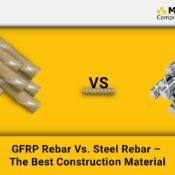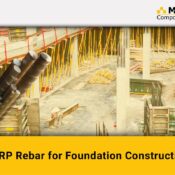Durability Redefined: GFRP Rebar's Resilience in Bridge Projects
For decades, steel rebar has been the cornerstone of bridge construction, ensuring the structural integrity of these vital transportation links. However, a new challenger has emerged in the arena of bridge reinforcement: Glass Fiber Reinforced Polymer (GFRP) rebar. This innovative material offers a compelling alternative to traditional steel, boasting superior durability and enhanced performance characteristics. Let’s explore how GFRP rebar is redefining bridge construction.
The Achilles' Heel of Steel Rebar: Corrosion
The biggest challenge with steel rebar is its susceptibility to corrosion. When exposed to moisture and chloride ions, typically from deicing salts used on roads in winter, steel undergoes an electrochemical reaction. This weakens the material and compromises the bridge’s structural integrity. Extensive corrosion necessitates costly repairs and, in severe cases, bridge replacement.
GFRP Rebar: The Corrosion-Resistant Champion
GFRP rebar, composed of glass fibers embedded in a polymer matrix, offers a game-changing solution. Unlike steel, GFRP is completely inert to chloride ions and remains unaffected by harsh environmental conditions. This inherent resistance to corrosion translates to significant lifecycle cost savings for bridge projects.
Beyond Corrosion Resistance: The Advantages of GFRP Rebar
The benefits of GFRP rebar extend far beyond corrosion resistance. Here’s a closer look at its additional advantages:
- Lightweight Champion: GFRP rebar boasts a fraction of the weight of steel rebar. This translates to reduced construction costs associated with transportation and handling of materials. Additionally, the lighter weight minimizes the dead load on the bridge itself, allowing for more efficient designs.
- High Tensile Strength: GFRP rebar offers superior tensile strength compared to traditional deformed steel rebar. This allows engineers to design lighter and more efficient bridge structures without compromising on strength.
- Enhanced Seismic Performance: The unique properties of GFRP rebar make bridges more resilient to earthquakes. Its high tensile strength and elasticity enable it to absorb and dissipate seismic energy more effectively than steel rebar.
- Electromagnetic Transparency: Unlike steel, GFRP rebar is electromagnetically transparent. This is crucial for bridges that house sensitive equipment, such as those employed in intelligent transportation systems.
Conclusion
The adoption of GFRP rebar in bridge construction signifies a paradigm shift towards a more sustainable and resilient future for our infrastructure. With its exceptional durability, superior performance, and environmental advantages, GFRP rebar is poised to redefine the way we build bridges.
MRG Composite Rebar
MRG Composite Rebar is a leading GFRP Rebar manufacturers in india and supplies worldwide. Our bars are stronger, lighter, and cost-effective than steel reinforcement bars. We are best known for our GFRP rebar. Our GFRP bars are the perfect choice for bridge construction.We are a leading GFRP Rebar manufacturers in India and supplies all over the world. We provide the best GFRP Rebar price in India and all over the world.
MRG Composite Rebar can provide high-quality industrial flooring. One of our specialities is in flooring for industrial and commercial clients. Our floors can help you keep your business look best. We offer a variety of flooring options to choose from.
All Categories
Recent Posts
GFRP Rebar vs. Steel Rebar: Strength, Durability & Benefits
GFRP Rebar for Foundation Construction
GFRP Rebar for Septic tank Construction
MON-SAT 8:00-9:00
+91 69 863 6420




